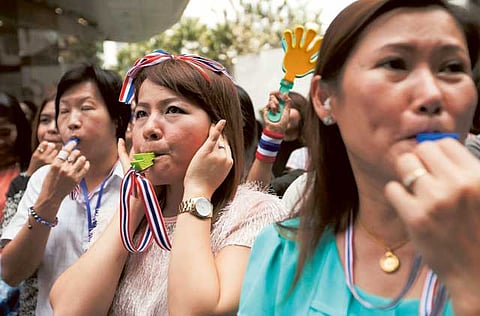Thailand might declare state of emergency
Government to deploy 15,000 police, troops to deal with planned Bangkok shutdown

Bangkok: Nearly 15,000 police and soldiers will be deployed in the Thai capital next week for the planned “shutdown” of Bangkok by demonstrators trying to overthrow the government, officials said on Wednesday.
Prime Minister Yingluck Shinawatra has called February elections following weeks of opposition street protests. But the demonstrators have vowed to block the vote, which they fear will only prolong the political dominance of her billionaire family.
The protesters say they will occupy the capital from January 13 until they win their battle to topple the government.
They plan to set up stages around the city, preventing officials from going to work and cutting off power and water to state buildings.
The government is mobilising 14,880 police and soldiers for the mass rally, national police spokesman Piya Uthayo said in a televised briefing.
“Our goal is to prevent any violence or clashes,” he said.
Officials say the government is ready to declare a state of emergency if needed to deal with any unrest, following several outbreaks of street violence in which eight people, including a policeman, have been killed and hundreds wounded.
Critics say the protesters want to provoke fresh clashes in the hope of triggering a military coup on the pretext of restoring order — an accusation the demonstrators deny.
Corruption allegations
The demonstrators, who largely comprise southerners, royalists, middle-class Thais and urban elite, accuse the billionaire tycoon-turned-politician, Thaksin Shinawatra, of corruption, and say he controls his sister’s government from his self-exile in a Gulf country.
They want an unelected “people’s council” to run the country to oversee vague reforms, such as an end to alleged “vote buying” through populist policies, before new elections are held in around a year to 18 months.
Thailand’s anti-graft panel said on Tuesday it would press charges against hundreds of politicians, mostly from the party of embattled Prime Minister Yingluck Shinawatra, over a failed attempt to amend the constitution.
The ruling adds to the political uncertainty in the kingdom, where the main opposition party is boycotting February elections called by Yingluck in an unsuccessful attempt to end weeks of mass anti-government protests.
The National Anti-Corruption Commission (NACC) — whose mandate includes investigating possible abuse of power — cleared 73 politicians, including Yingluck, of wrongdoing in connection with a bid to make the senate, the legislature’s upper house, fully elected.
But 308 others from the upper and lower houses were found to have violated the law, based on a preliminary investigation, by drafting or proposing changes to the charter, panel spokesman Vicha Mahakun told reporters.
If officially found guilty by the commission their cases will be sent to the upper house of parliament, which has the power to ban them from politics for five years.
Political manoeuvres
Yingluck’s supporters see the case as one of a number of political manoeuvres aimed at removing her Puea Thai party from power.
Protesters seeking to curb the political dominance of the premier’s billionaire family have vowed to block the February 2 election. They have the support of many in the kingdom’s elite.
The demonstrators want an unelected “people’s council” to run the country to oversee vague reforms, such as an end to alleged “vote buying” through populist policies, before new elections are held.
The anti-government movement is threatening to “shut down” Bangkok from January 13, with measures including setting up protest stages around the capital and cutting off power and water to government buildings.
They held a second “warm-up” march on Tuesday with thousands marching through the capital’s riverside districts.
Security officials said on Tuesday that Yingluck was ready to declare a state of emergency if needed next week.
“Everything has been prepared to declare emergency rule if the protests seem likely to escalate into violence, for example with attacks on people, buildings or acts of terrorism,” National Security Council chief Paradorn Pattanatabut told reporters.
“Soldiers would be deployed at public buildings while police would act as fast response units and on the frontline,” he said.
Thailand has been periodically convulsed by political bloodshed since Yingluck’s older brother Thaksin Shinawatra was overthrown by royalist generals in a coup in 2006.
Eight people have been killed and about 400 wounded in recent street violence.
Legal rulings have played an important role in politically turbulent Thailand in the past, and Yingluck’s opponents fear her party could fall victim to another judicial or military coup.


